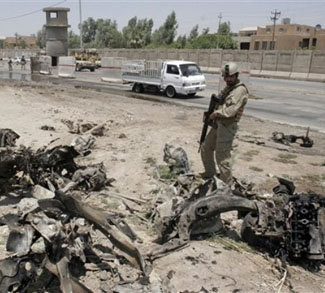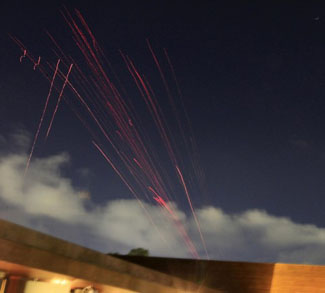Over the past several weeks, US pilots operating out of the American military installation of Camp Lemonnier in Djibouti, key to the War on Terror, have had to deal with an unusual— if not entirely unexpected—threat: military-grade lasers allegedly coming from the new Chinese base next door. As far as US military officials are concerned, these lasers represent a serious danger to pilots and their aircraft. The Pentagon went so far as to file a formal complaint to China about it.
Beijing’s response? “The Chinese side consistently strictly abides by international law and laws of the local country, and is committed to protecting regional security and stability.”
The US military will be treated to various versions of that response in the months and years to come. Competing Chinese and American interests in the highly strategic confines of Djibouti are bound to spill over into provocations and accusations, and the laser incident is probably just a taste of the conflicts yet to come. American officials have become increasingly vocal over fears of Chinese influence in Djibouti and neighboring Ethiopia.
Those warnings have thus far fallen on deaf ears in the Horn of Africa, thanks in no small part to haphazard diplomatic outreach over the past few months. The region welcomed its second senior US diplomat in as many months at the end of April, as Principal Deputy Assistant Secretary Donald Yamamoto toured Eritrea, Djibouti, and Ethiopia. His visit came after a similar tour by former Secretary of State Rex Tillerson in March ended with Tillerson’s unceremonious dismissal.
Tillerson warned Ethiopia (and Africa in general) of the dangers of dealing with the Chinese for African sovereignty and democracy, but that warning was almost immediately overshadowed by his firing. Besides firing Tillerson, President Donald Trump has further complicated America’s uphill battle to maintain its influence in Africa with offensive comments, moves to cut aid to the continent by 35%, and the administration’s failure to appoint ambassadors to key African nations.
Even with those missteps, it is not too late for the U.S. to re-engage its African partners and reverse the trend of waning US credibility and influence. The alternative is to leave China unopposed in consolidating its own interests on the continent. While America stumbles, Beijing is already laying the groundwork for commercial and diplomatic dominance in Africa.
Djibouti and Ethiopia are both excellent examples of the stakes involved in this competition. Djibouti’s Camp Lemonnier is America’s only permanent military base in Africa, home to around 4,000 troops and critical to counterterrorism operations in Somalia and Yemen. Djibouti also sits astride the Bab el-Mandeb maritime thoroughfare, through which between 12.5% and 20% of international trade passes through every year. That strategic value explains why Djibouti is also home to outposts from France, Italy, Japan, and of course China.
Ethiopia, meanwhile, has been the fastest growing African economy over the last decade, with the kind of per capita growth and poverty reduction rates that turn the world’s poorest countries into sought-after consumer markets. Since 2000, Ethiopia’s GDP per capita has grown 277% and the International Monetary Fund (IMF) projects it will continue at a rate of 6.2% through 2022. On the same token, the poverty rate has fallen 31%. This rapid growth rate has made Ethiopia a key export market for Chinese goods. Of the $17.6 billion worth of goods Ethiopia imported in 2015, $5.73 billion came from China as opposed to just $934 million from the US.
Recent developments in both countries reveal how China, which has lent over $94 billion to African governments since 2000, has gained the upper hand. Djibouti stunned its outside partners and the global shipping industry by seizing the Doraleh Container Terminal (DCT) from the Dubai-based company DP World this past February. Djibouti’s kleptocratic government, dominated by its strongman president Ismail Omar Guelleh, has long claimed that DP World bribed Abdourahman Boreh, former Guelleh ally and now prominent dissident, to modify its contractual terms for operating the port. For good measure, the Guelleh regime also brought terrorism charges against the exiled Boreh and sentenced him in absentia.
Neither the corruption allegations nor the terrorism conviction held up against an arbitration decision reached in London last year, but Djibouti thumbed its nose at the arbiters by seizing the port anyway. The move has given rise to suspicions that the Chinese may seek to monopolize trade at the port. Chinese interests have already secured another key element of Djibouti’s shipping and container infrastructure: the new Doraleh Multipurpose Port, built and operated by China Merchant Holdings and located adjacent to China’s new military base.
These two ports in Djibouti are integral to a broader regional infrastructure drive being financed by China. The $4 billion in financing needed to complete Africa’s first electric railway (spanning 470 miles between Addis Ababa in Ethiopia and Djibouti) was provided almost entirely by Chinese banks, and the actual construction work was undertaken by Chinese firms. It’s estimated Djibouti alone owes the Chinese more than $1.2 billion, fueling talk of a “debt trap” that will leave governments beholden to China indefinitely. China, of course, claims its motives are entirely altruistic.
Both Djibouti and Ethiopia have one other reason for privileging their relationships with Beijing: the Chinese government has no interest in commenting on their terrible human rights records and fierce repression of internal dissent. Despite accusations of realpolitik, the U.S. is nonetheless a vocal advocate of democratic government and the ethical treatment of citizens by the state. China’s policies of non-interference mean its gaze extends no further than business interests and infrastructural development.
That is why the shifting fortunes of American and Chinese interests in Africa matters for more than just geopolitics. Despite its flaws, the civil society actors and human rights activists who are indispensable for the social and political development of the continent have an ally in the United States. The same cannot be said of China.
The opinions, beliefs, and viewpoints expressed by the authors are theirs alone and don’t reflect any official position of Geopoliticalmonitor.com.




